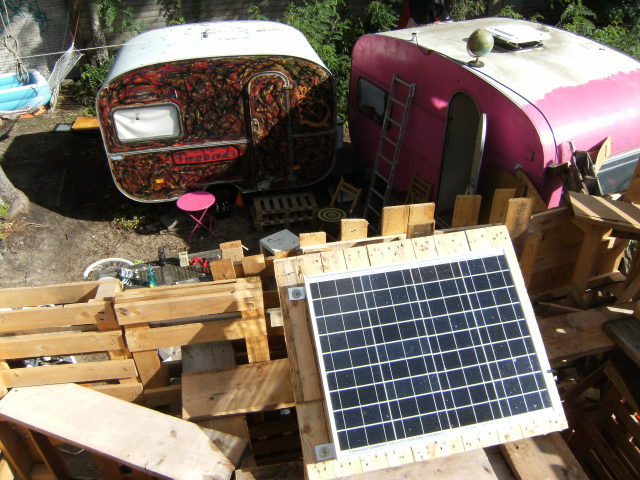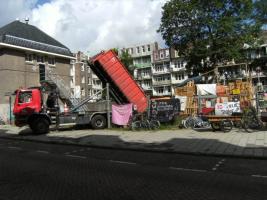Introduction
It is the fourth time activists have squatted a piece of land in the Pijp (an area of Amsterdam) and by far the most succesful action. They are protesting against unnecessary demolition and speculation as well as taking action in support of local neighbourhoods for a sustainable future.

Some history
On July 11, 2008, a group of people from the Pijp squatting group and Groenfront! Amsterdam squatted a vacant lot at Rustenbergerstraat 438-440. A school had previously stood on the land and was demolished against the wishes of the neighbourhood, probably to prevent it being squatted. There are currently no plans for the site, which has a tree which is protected by permits. Previous land squats had been evicted quite brutally by police so this time the activists were prepared – they were in large numbers, had the support of local residents and made sure their caravans were well secured in the ground!
After one month, the project declared itself a free state and the residents pledged to live in a carbon neutral fashion on the site. Instead of waiting for local government to decide what to do with the land they decided to take action themselves! Permaculture gardens were set up and solar panels were installed. Local squat cafes are doing benefits in support of the project. In September an open day was held with a tour speakers and discussions

Living at SWOMP (in the words of one resident)
The whole thing has grown into a climate friendly experimental garden. Every day we are learning more about the problems you encounter when having to provide for yourself (doing it in a way which means in the future you can keep providing yourself). These are the same problems society / the community will faces soon. We are experimenting with permacultures, we have a groundwaterpump and a solarcell and are planning to build our own eco toilet.
Being busy with this I’m meeting a lot of other people being busy with similar stuff, and suddenly the feeling of being an activist calling out in the land of the deaf is changing. More and more people seem to be realising something has to be done, and most importantly, we can do it (we are going to win)!
We stumbled across the concept of transition towns. Apparently others are doing the same as us. Others, not activists just communities. Communities that stop and think: how are we going to deal with the upcoming (unavoidable) oil-crisis and climate change? What happens when the trucks stop driving and bringing us food and produce from all over the world? Looting, only the fittest will survive? Or can we as a community prepare ourselves and equip ourselves with workable solutions. We should start preparing: Where do we get food? Who heals the sick, how do we transport? How do make tools without our current technology? And most important of all how do we prevent future crisis? How can we find a balanced way of living without wearing out our own surroundings?
New ethics will have to be developed. This all might seem a distant dream or fantasy but it is already happening all over the world. With 33 transition towns in England and 77 worldwide. And four times more being set up worldwide. It is actually a very accessible way of changing, it’s realising that we ourselves need to do it and nobody else. It starts with creating consciousness. Not about the upcoming crisis, everybody knows about that by now and activists all over the world feel frustrated about everybody knowing but nobody acting on it.
We need to grow consciousnes about self-determination, and about the possibilties that you have as an individual and a community. Of course the government and corporations won’t change by themselves. We don’t need to wait for them, we should even exclude them. The steps seem so big but are actually small and achievable. It starts with growing consciousness, its almost like a sect man! Wherever some people start being busy with transition towns, all the people around them get infected and enthusiasm soon grows a network. A network starts having meetings, and in the meeting realistic goals will be set. “In however many years we should be able to get at least 50% of our food from our own lands, by then we need to have reduced our oil-dependence, at least by the year of XXXX, we shall be totally independent”.
Stuff like that, read it, it’s inspiring. In England ther are some towns, villages, dwellings, but also neighbourhoods that started thinking about the future. These towns or dwellings will be the pioneers in the time of transition which pretty soon everybody is going to experience. We can wait till our wallets force us to change, or we can be the ones who will later have the advantages of having started off early. It’s just a logical step to take in a time like this.
Links
In”>http://www.steenbreek.org/img/pers/DeMorgen_20080906.pdf>In the Belgian press
